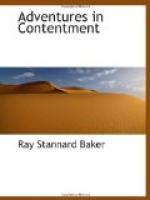“Try it,” I said eagerly.
“I will,” he said, rising from the table, and grasping my hand. “I’ll stay here.”
I had a peculiar thrill of exultation and triumph. I know how the priest must feel, having won a soul from torment!
He was trembling with excitement and pale with emotion and weariness. One must begin the quiet life with rest. So I got him off to bed, first pouring him a bathtub of warm water. I laid out clean clothes by his bedside and took away his old ones, talking to him cheerfully all the time about common things. When I finally left him and came downstairs I found Harriet standing with frightened eyes in the middle of the kitchen.
“I’m afraid to have him sleep in this house,” she said.
But I reassured her. “You do not understand,” I said.
Owing to the excitement of the evening I spent a restless night. Before daylight, while I was dreaming a strange dream of two men running, the one who pursued being the exact counterpart of the one who fled, I heard my name called aloud:
“David, David!”
I sprang out of bed.
“The tramp has gone,” called Harriet.
He had not even slept in his bed. He had raised the window, dropped out on the ground and vanished.
X
THE INFIDEL
I find that we have an infidel in this community. I don’t know that I should set down the fact here on good white paper; the walls, they say, have eyes, the stones have ears. But consider these words written in bated breath! The worst of it is—I gather from common report—this infidel is a Cheerful Infidel, whereas a true infidel should bear upon his face the living mark of his infamy. We are all tolerant enough of those who do not agree with us, provided only they are sufficiently miserable! I confess when I first heard of him—through Mrs. Horace (with shudders)—I was possessed of a consuming secret desire to see him. I even thought of climbing a tree somewhere along the public road—like Zaccheus, wasn’t it?—and watching him go by. If by any chance he should look my way I could easily avoid discovery by crouching among the leaves. It shows how pleasant must be the paths of unrighteousness that we are tempted to climb trees to see those who walk therein. My imagination busied itself with the infidel. I pictured him as a sort of Moloch treading our pleasant countryside, flames and smoke proceeding from his nostrils, his feet striking fire, his voice like the sound of a great wind. At least that was the picture I formed of him from common report.
And yesterday afternoon I met the infidel and I must here set down a true account of the adventure. It is, surely, a little new door opened in the house of my understanding. I might travel a whole year in a city, brushing men’s elbows, and not once have such an experience. In country spaces men develop sensitive surfaces, not calloused by too frequent contact, accepting the new impression vividly and keeping it bright to think upon.




